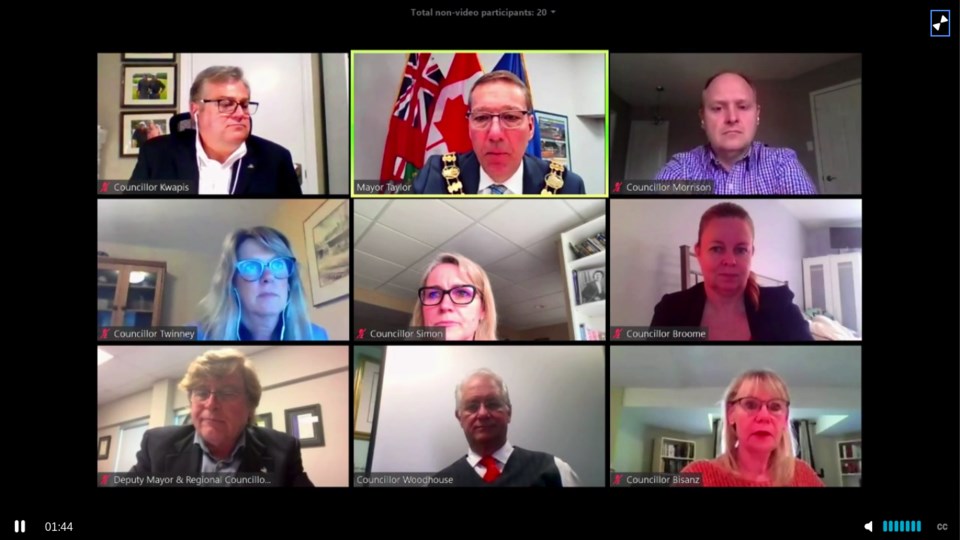The Town of Newmarket, like many of its residents and businesses, is taking a financial hit as a result of the COVID-19 pandemic that has brought most activities to a grinding halt.
So far, it is estimated that the coronavirus crisis could leave town coffers short about $8.5 million this year alone, according to a financial update presented May 19 at a special meeting of council live-streamed on its website.
Municipal budgets are required to be balanced under the Municipal Act.
In battling the highly contagious respiratory disease that has to date infected 190 people in Newmarket, 21 of whom died as a result of COVID-19, the town has incurred extra costs at the same time as revenues declined.
A nearly $1-million tax relief program has been rolled out to homeowners and businesses, for example, and new costs to the tune of $133,000 a month are on the books for such things as increased cleaning, the purchase of personal protective equipment, communications, technology, and paid staff absences.
The mid-March closure of town facilities and the deferral of construction activity during the near-lockdown of the community has also had a major impact on its user fee revenue, the report states, particularly as all recreation and culture programming was shuttered.
The financial report also notes that although 2019 is expected to be a profitable year for Newmarket-Tay Power, there may be challenges in 2020 as a result of the pandemic, such as the impact on its cash flow that may result in it not having the liquidity to make its $1.3 million dividend payment to the town.
“The 2019 dividend, which would normally be paid in December 2020, is not guaranteed,” financial services director Mike Mayes said.
“The pandemic is disrupting delivery of town services and adding additional costs as a result ...estimated to amount to be in the range of $1.5 million to $2 million, depending upon how long the emergency lasts. This is in addition to the costs for emergency response and recovery,” Mayes stated in the report.
Amid uncertainty about when the town may reopen, council has several key measures to consider that would help offset the multi-million deficit to its 2020 operating budget, which guides its day-to-day operations.
Those options include staffing, such as a hiring freeze for new and vacant positions, a halt on discretionary spending, service-level reductions in areas like parks and playgrounds, grass cutting, upkeep on tennis courts and trails, and tree planting and removals, repairs to town facilities and sidewalks, and use of the town’s 2019 surplus and reserves.
Getting its finances under control is crucial to avoid a tax hike next year, says the Newmarket Taxpayers’ Advocacy Group, which submitted a deputation to council May 19 on the subject.
“For 2021, a one per cent tax increase will generate property tax revenues of approximately $625,000,” the group said in a statement to NewmarketToday. “That would be, at worst, a tax increase of 13.6 per cent just to mitigate the projected deficit. Even if the deficit is reduced by 50 per cent, it will still be a large tax increase unless strong, immediate action to manage expenses without depleting reserves is implemented right away."
Mayor John Taylor said that as a member of the Newmarket-Tay Power board, he will be “striving to ensure the town receives full payment of the dividend”.
Taylor also said that the full impact of the COVID-19 pandemic is not yet known, and there are many “moving parts” in trying to mitigate the financial impact.
Councillor Jane Twinney, however, expressed a strong desire that council consider reducing the budget shortfall, saying residents would understand the situation that the town faces.
“We need to be very strong in knowing that we have to reduce our deficit and we’re going to have to, perhaps, do things we don’t want to do, like looking at service-level reductions,” Twinney said. “I think we need to seriously look at what we can do that really is essential at this time. If the grass gets a little bit longer than normal, then so be it, at this time.”
“I think we really have to be cognizant of the fact that we all have to tighten our bootstraps,” said Twinney. “I appreciate that we are looking at these measures and I think we have to be quite strong.”
Councillor Christina Bisanz said she was concerned about potential service-level reductions, particularly as a phased reopening of the community has begun and outdoor spaces become more important for residents cooped up for months to slow the spread of the coronavirus.
“We’re not going to be up and running fully this summer, but our parks and playgrounds, once deemed safe to be open, will become even more important for residents to get out for exercise, and a place for kids to play,” Bisanz said. “I’m curious about the service-level reductions and would it be adding insult to injury about the pandemic, anyway. But we do need to look at having the deficit reduced.”
Town staff are expected to flesh out the options to help lessen the financial burden on the budget and report back to council.
To read the financial update report, visit here.


